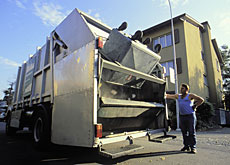
Cost pressures leave communities exposed

The number of municipalities in Switzerland has fallen by some 200 in the past decade, primarily as a result of mergers, a political expert tells swissinfo.
Andreas Ladner says many municipalities are simply too small to function properly as political units, a reality which is only grudgingly accepted by the inhabitants.
The term municipality fails to capture the significance and importance of these sometimes tiny political units to the Swiss.
Direct democracy starts at the level of the municipality (known locally as the “community”), and allegiance is always first to the community, then to the canton, and last to the federal government (whose motives are frequently viewed with suspicion).
But for many of the smallest communities, finding the resources – both financial and human – to function is becoming increasingly difficult, according to Ladner, a political expert and sociologist, who in April takes up a professorship at Lausanne’s Graduate Institute of Public Administration.
swissinfo: In [French-speaking] canton Vaud, voters recently threw out an attempt to fuse two municipalities. Is this a one off, or the start of a trend against such mergers?
Andreas Ladner: It’s more the rule than the exception. Often it takes several votes before the public finally accede to a merger of communities. The issue is becoming more important in Switzerland, but some regions are more sensitised to it than others.
Canton Fribourg [also French-speaking], for instance, has seen the largest number of mergers among communities, primarily because there they tend to be small. Even today, half of Fribourg’s communities have fewer than 500 inhabitants. [Italian-speaking] Canton Ticino has also seen a large number of mergers.
In canton Zurich and those in central Switzerland [, all German-speaking,] the communities tend to be larger so there is less need for such mergers.
swissinfo: Are these mergers really necessary?
A.L.: The smaller communities are finding that they cannot manage their responsibilities any longer. They can’t find people who are able and willing to undertake roles in the executive and administration, and they don’t have the money to pay these people properly.
In other cases, a merger is a logical outcome after years of close cooperation between two communities. And sometimes a canton deems a merger necessary, and helps the process along with financial incentives.
swissinfo: Do communities today have more work?
A.L.: Yes, definitely. But their responsibilities and costs are relatively small compared with those in other European countries. This is primarily because between the community and the federal government, there exists the canton, which takes care of many legal and administrative matters.
The result is that a community with fewer than 2,000 inhabitants has little room for manoeuvre. But the Swiss conveniently tend to overlook this fact because the community and the canton are at the centre of the country’s political culture.
swissinfo: Is this debate influenced by economic issues?
A.L.: The economy influences financial issues at all levels of government – and that’s a reality that until recently was difficult to accept.
However, we can’t measure [the value] of everything in terms of economics. Our political system has advantages which outweigh the costs involved.
swissinfo: Is the growing influence of cities changing the Swiss political system?
A.L.: Today there are cities which are seeking to expand by absorbing neighbouring communities. That’s the case in Lugano and Lucerne, for example.
Social change is driving the growth of cities, and this is confirmed by policy, which supports decentralisation and the creation of metropolises, whose development is supposed to benefit everyone.
We are also seeing the end of federalism, a concept which is based on the view that all regions – even the least developed – must achieve the same degree of development. Today, we’ve realised that this is simply too expensive.
And for the economy it is vital that dynamic centres are developed.
swissinfo-interview: Fredéric Burnand
The number of communities in Switzerland has dropped from over 3,000 in the mid-1990s to fewer than 2,800 today.
More than half have fewer than 1000 inhabitants; just 4% have over 10,000.
Over half of the Swiss population live in communities with more than 10,000 inhabitants.
Swiss communities are among the smallest in Europe. Only in France, Greece and Iceland are smaller ones to be found.
The Swiss are first citizens of their community, then of their canton and finally then of the Confederation.
Cantons and communities have their own elected governments and parliaments.
Communities have a wide degree of autonomy to decide policy and local laws, as do the cantons.

In compliance with the JTI standards
More: SWI swissinfo.ch certified by the Journalism Trust Initiative




























You can find an overview of ongoing debates with our journalists here . Please join us!
If you want to start a conversation about a topic raised in this article or want to report factual errors, email us at english@swissinfo.ch.